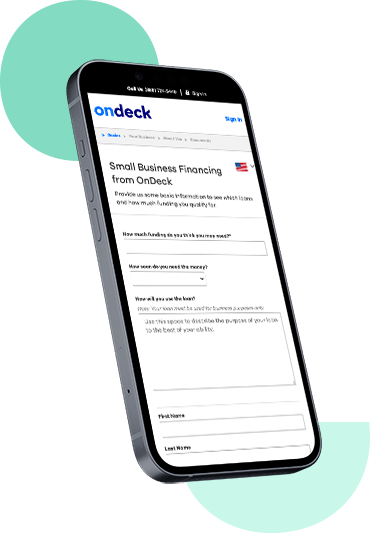
Our minimum requirements are designed to empower.**
At OnDeck, we believe a business shouldn’t be defined by its credit score. That’s why we help hardworking business owners quickly and easily get funding they may not get from a bank. Before you apply, make sure you meet our minimum requirements and aren’t operating in one of our restricted industries.
1 Year
in business
Business
checking account
$100K
business annual revenue
625
personal FICO® score
It helps if you meet these additional criteria.
Transparency is something we pride ourselves on. That’s why we have the OnDeck Loan Comparison Tool to clearly explain your loan terms before you sign a contract. It’s also why we will let you know up front that some additional criteria give your business a good chance of being approved with OnDeck.
2+ years
in business
675+
personal FICO® score
$250K+
business annual revenue
$3K+
monthly average balance

Ready to apply with OnDeck?
If you’re in need of fast business funding, get started with your application today!
-
Step 1
Complete the application.
We just need some basic information about your company, including recent bank statements. That’s much simpler than other lender requirements for a business loan.
-
Step 2
Get a decision.
Work with an expert loan advisor to choose the best option for you.
-
Step 3
Receive your funds.
Sign your contract and get funds as soon as the same day.†
5 tips to help build your business credit.
If you’re in the early stages of your business, establishing a business credit history can go a long way toward helping you find business funding. Consider taking these actions to get started.
-
Tip 1
Register your business.
The first step is to choose a business structure and register your business in the state you do business. Most businesses don’t need to register with the federal government, but you do need to file for a federal tax identification number. Unless you’re in a state with no state income tax, you’ll also need to get a state tax ID number. If you need help registering your business, you may want to consult with your local chamber of commerce.
Tip 2Establish a business credit file.
Verify whether your company has a credit file with the major business credit reporting bureaus, including Dun & Bradstreet, Equifax Small Business and Experian Business. If you have an existing credit file with any agency, make sure that all the information listed is correct and updated. If you don’t already have a file, you can apply for one directly through each bureau.
Tip 3Monitor your credit.
Your personal credit may come into play when you apply for a business loan. Since lenders may review your personal and business credit ratings, it’s important to watch both and take steps to improve your scores, if necessary. These tips can help you improve or maintain your personal and business credit scores:
- Aim to always make payments on time.
- Keep your credit utilization ratio low.
- Promptly dispute any errors on your personal or business credit reports.
Tip 4Maintain positive cash flow.
An important factor of qualifying for a loan is having the ability to repay the funds that you borrow. You can show that you’re capable of repayment by protecting and maintaining your cash flow. Learn how to increase your cash flow in order to help qualify for a business loan.
Tip 5Borrow from companies that report to business credit bureaus.
Business credit bureaus calculate credit scores based on available payment data. But not all lenders report payment data to them. To make sure that you’re actually building business credit, work with companies that report payment data to at least one major business credit bureau. OnDeck reports to Experian.
We’re fluent in small business — and ready to take your call.
You don’t need to be an expert on small business loans. Our team of
(888) 269-4246
Monday – Friday
9 a.m. – 7:30 p.m. ET

